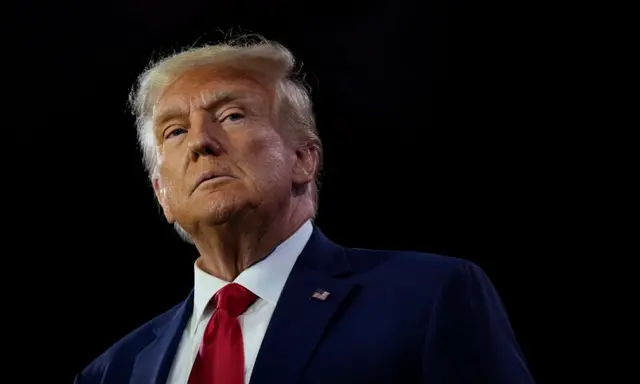Florida-based federal Judge Aileen Cannon asked the U.S. Department of Justice (DOJ) to justify its continuing use of a District of Columbia grand jury in hopes of laying additional charges in the case about former President Donald Trump’s handling of classified government records at his Florida home.
Using the work of a grand jury in one jurisdiction to indict a defendant out-of-state isn’t necessarily unconstitutional, but it is unusual, a legal expert told The Epoch Times.
The records case is being heard in the judge’s courtroom in Fort Pierce, Florida.
The indictment for the obstruction counts was announced in late July and came after the bulk of the counts had already been made public. The former president allegedly engaged in obstruction by directing that security footage from his residence at the Mar-a-Lago Club in Palm Beach, Florida, be deleted.
The District of Columbia grand jury indicted Mr. Trump for his alleged efforts to overturn the results of the 2020 presidential election. Mr. Smith is also overseeing that prosecution.
The 45th president is accused of violating the federal Espionage Act and other federal statutes for allegedly conspiring to obstruct justice, make false statements, and conceal documents. The indictment states that Mr. Trump stored classified documents in unauthorized locations at his home, including in his bedroom, a bathroom, and a ballroom. Mr. Trump also allegedly shared some of the materials with other individuals who lacked security clearances.
In an Aug. 7 order, Judge Cannon directed the DOJ to “address the legal propriety of using an out-of-district grand jury proceeding to continue to investigate and/or to seek post-indictment hearings on matters pertinent to the instant indicted matter in this district.”
The court imposed a deadline of Aug. 22 for the government to respond.
The fact that the work of a grand jury in the nation’s capital, where the available pool of jurors in the Democrat stronghold is considered largely hostile to the former Republican president, laid the groundwork for indictments in federal court in Florida, could present thorny but not necessarily insurmountable problems when the matter is tried.
Even if this possible instance of grand jury-shopping by Mr. Smith fails to derail the prosecution’s case in the records prosecution against Mr. Trump and other defendants, defense attorneys may raise the issue on appeal if their clients are ultimately convicted.
Curt Levey, an attorney who is president of the Committee for Justice, a conservative legal advocacy nonprofit, told The Epoch Times that he was not aware of any federal statute that forbids the practice.
“Certainly the Constitution doesn’t require it,” he added.
“Typically, the grand jury is in the same federal district where the case is going to be tried,” Mr. Levey said in an interview.
Even if the DOJ has an internal policy precluding the practice, it is not clear that the department would follow it, he said.
“I mean, there’s also a DOJ policy that says ‘try not to indict people at a time when it will interfere in an election,’ and they didn’t seem to really follow that one,” he said.
In the same order, Judge Cannon noted that the prosecutors, who are also pursuing criminal charges against longtime Trump aide Waltine Nauta, are demanding a court hearing regarding any possible conflicts of interest one of his attorneys may have related to his representation of Mr. Nauta.
Mr. Nauta, a former sailor in the U.S. Navy who worked in the Trump White House, is accused of removing government documents from the White House and helping Mr. Trump keep them away from federal officials who demanded their return.
The DOJ is asking for a so-called Garcia hearing regarding attorney Stanley Woodward of Brand Woodward Law in Washington.
A Garcia hearing is “a legal proceeding that ensures a defendant, who is one of two or more defendants represented by the same attorney, understands the risk of a conflict of interest,” according to online resource LSD Law.
“This type of hearing also informs the defendant that they have the right to an attorney who does not represent anyone else in their case. The hearing is held to protect the defendant’s rights and ensure fair representation in court.”
Judge Cannon’s order notes that the special counsel made a motion for a Garcia hearing to inquire into “potential conflicts of interests that may arise from [Mr. Woodward’s] prior and current representation of three individuals the Government may call to testify at the trial of his client Waltine Nauta.”
Mr. Nauta is directed in the order to respond to the Garcia motion by Aug. 17. The response is to include a discussion of the legal propriety of the prosecutor’s use of an out-of-state grand jury.
The court could opt to furnish Mr. Nauta with additional independent counsel in order to ascertain if he is being fairly represented by Mr. Woodward.
Asked to comment, Mr. Woodward replied “no comment” by email.
Another of Mr. Nauta’s attorneys, Sasha Dadan of Dadan Law Firm in Fort Pierce, also declined to comment.
But Peter Carr, a spokesman for Mr. Smith’s office, told The Epoch Times, “We will respond at the appropriate time through a filing with the court.”
Mr. Carr said by email that the court was advised on Aug. 2 that two grand juries were involved in the case.
He forwarded to The Epoch Times a copy of a document that he called “our original court filing that the court is responding to in this order.” He noted the document titled “Motion for Garcia Hearing” that was filed with the court in Florida by Mr. Smith, disclosed the use of two grand juries.
“The grand jury in this district and a grand jury in the District of Columbia continued to investigate further obstructive activity, and a superseding indictment was returned on July 27, 2023,” the motion states.



